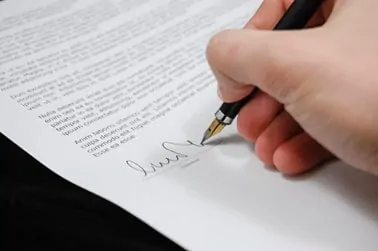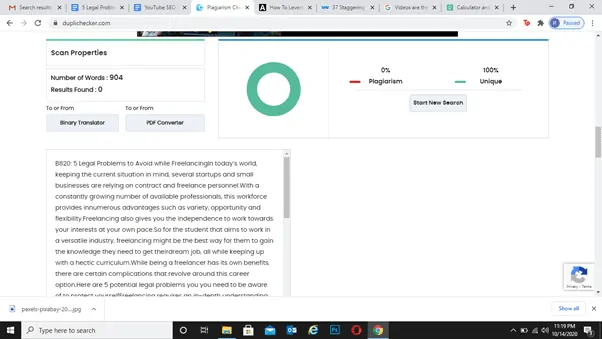Last Updated on 4 months by Christopher Jan Benitez
In today’s world, keeping the current situation in mind, several startups and small businesses are relying on contract and freelance personnel.
With a constantly growing number of professionals, this workforce provides many advantages such as variety, opportunity and flexibility. Freelancing also gives you the independence to work towards your interests at your own pace.
So, for the student that aims to work in a versatile industry, freelancing might be the best way for them to gain the knowledge they need to get their dream job, all while keeping up with a hectic curriculum.
While being a freelancer has its own benefits, there are certain complications that revolve around this career option.
So if you are a freelancer, or planning to become one, here are five freelance laws you need to be aware of to protect yourself:
1. Plagiarism and Property Rights
Freelancing requires an in-depth understanding of plagiarism and property rights for two major reasons- first is to make sure you aren’t guilty of it, and the second is to safeguard your work.
If you are not cautious about the content you release, you may find yourself in a legal confrontation over copyright or plagiarism.
Freelancers can get charged for infringing another individual or company’s property rights or copyright, even if it was done unknowingly.
Content writers and college students are also inclined to face coincidental plagiarism, and that’s why it is important for them to utilise online plagiarism checking software that is readily available online.
To prevent any future disputes regarding plagiarism, it is important to understand it’s advantages and working.
So how exactly does a plagiarism checking software work?
Plagiarism detectors are accessible online and help to determine whether your content has been duplicated from another source. This software gives us access to several sources and databases that allow individuals to proofread their work effectively and quickly.
It searches for content similarity by scanning the database and detecting text elements and then compares it with other elements.
After the process of comparison is completed, the software then highlights the similar elements, if there are any.
Plagiarism detection software functions similar to the search engines, like Google, which index different content on the web. The main dissimilarity between the two is that the plagiarism software compares and identifies similar elements on the web instead of simply searching for them.
2. Contract Violations
A contract is a legal document protected by the law. It defines the duties and rights of the parties that have entered an agreement.
When the terms and conditions are clearly stated between parties, it prevents future misconceptions and drawbacks. It eliminates ambiguity and enforces smooth professional relationships.
Freelancing without a contract is a risk simply not worth taking. It could lead to clients refusing to pay for your work, and without a contract set in place, you wouldn’t be able to take action.
That is undoubtedly not a situation you should look forward to.
Make sure that all your clients agree to file contracts that include every detail such as the duration, number of iterations, and the pay.
If your client expects you to work beyond the agreed iterations, ensure that to put down a rate of pay for your extra work.
3. Trademark Infringement
A trademark is the Intellectual Property (IP) of a freelancer that safeguards the logos, signs, and symbols which define and differentiate them from others in the industry.
The trademark registration procedure is similar for both companies and individuals, and it is often best to hire a law firm to steer this process for you.
As a freelancer, you can protect and establish your brand identity by applying for a trademark that is unique to you.
However, it is important to ensure that your future trademark is authorized and authenticated since trademark infringement has hefty legal implications.
4. Conflict of Interest
It is your responsibility to check if you have any agreements that interdict you from operating as a freelancer while working with your existing employer in order to avoid any possible legal implications.
Although it is possible to be a freelancer alongside being employed, it is essential to ensure that your freelance work does not affect your working hours and productivity as an employee of the current organisation.
Violating agreements and disclosing confidential company information could lead to serious repercussions and could also lead to the termination of your duties.
Make sure you understand the paperwork you sign, such as non-disclosure agreements and non-compete agreements to distinguish between your two professions.
5. Taxation
As a freelancer, you are essentially self-employed. While working for oneself has its own advantages, it can also cause occasional complications- especially with filing taxes.
If you earn your income as a freelancer, you often end up filing taxes as a businessperson. Ensure to collect and transcript the various sources of your income carefully, as freelancing involves having several sources of income.
The most advisable method to manage your tax payments would be to hire the services of a tax professional to ensure you adhere to the tax regulations of your country.
Conclusion
While becoming a freelancer can be a rewarding career option, it is important for you to consider the legal requirements and understand them clearly before you commit yourself to this profession.
Now that you are aware of the legal dos and don’ts, Happy Freelancing!
Author Bio:
As an Assignment Expert, Bella delivers online sessions at Expert Assignment Help, helping students with writing essays and assignments. She is the co-founder and education consultant at Top My Grades. Beyond work, you can find her baking a fresh batch of cookies in her kitchen.




